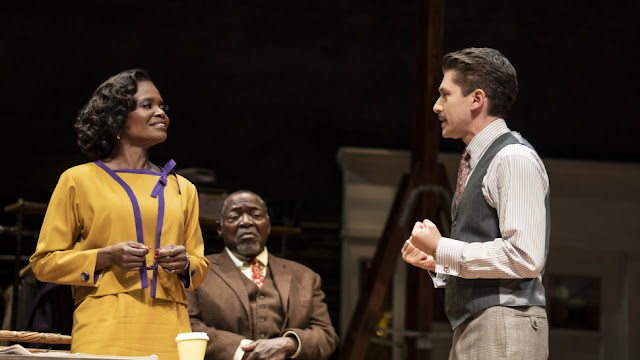Trouble in Mind is an eerily precedent show. Written and premiering off-Broadway in 1955, it is an illuminating show about the depictions of black actors on stage and screen. Producers, who wanted to take the show to Broadway in 1957, ironically asked the author to tone down the Black references in the play. Which is specifically what the play is about. Playwright Alice Childress would not comply, and so we come to the Broadway Premiere of Trouble in Mind some 66 years late. It was worth the wait.
 |
| Brandon Michael Hall, Jessica Frances Dukes, Michael Zegan, LaChanze, Chuck Cooper (Joan Marcus) |
Trouble in Mind covers a few days of a play rehearsal, with the new actors running through their lines and blocking. LaChanze plays Wiletta Mayer, the first to arrive to a bare stage set. She has a bit of banter with building manager Henry (Simon Jones). It is a small but critical moment that establishes that Wiletta and Henry both love the stage. This builds a bond with Henry (and the audience), who feels the same. Soon they are joined by a young Black man, a first time actor and recent college graduate, John Nevins (Brandon Michael Hall).
Since it is John’s first real stage job after college, Wiletta explains the power dynamics in the theater world. Blacks have learned a method to keep the peace and their jobs; laugh at jokes no matter if they are funny, do not argue over a scene, and defer when asked, are among a few of them. John listens but takes very little to heart as he is, and expects to be, treated as an equal. Wiletta cannot help but cynically note the types of roles Blacks get: servants, mammies, outlaws and slaves.
During their talk Millie (Jessica Frances Dukes) comes in. Millie is Wiletta’s closest frenemy. The two ladies talk, joke and exchange friendly insults as they wait for the rest of the cast. Next up is Judy (Danielle Campbell) the new white ingénue. Judy is fresh, idealistic and a recent transplant from Connecticut. Then Sheldon (Chuck Cooper) arrives, and now the cast is mostly in attendance. Unaware of the unspoken rules, Judy socializes with the rest of the cast, all Black, on stage.
Finally, the director Al Manners (Michael Zegen) arrives with a pep talk and a smile. Al has worked with most of the cast before and greets them warmly. Mr. Zegen is great in this role, giving a razor’s edge performance between friendly and dismissive. His character’s friendship with Wiletta and the cast makes the Al a sympathetic character. Still, the Black cast cannot help but giggle as John notices all the mannerisms in Al which Wiletta had warned him about. A run through starts and the intelligent Black cast members slip into on stereotypical roles, their English easily switching to a “Stepin Fetchit” dialect.
All goes well until a scene comes up that Wiletta objects to. She and Al superficially discuss it, but Al quickly pulls rank, pledging to raise the issue to the playwright. When Wiletta brings it up again the next day, Al notes that the writer and director want it the way it is. Wiletta explains that a real mother, black or white, would never act in this way.
 |
| LaChanze, Chuck Cooper, Michael Zegen (Joan Marcus) |
Wiletta’s objection grows into an argument as Al demands she play the scene as written. Their friendship cannot overcome the disagreement. In fact, this disagreement goes right to the heart of their relationship.
Trouble in Mind speaks to many of us. If you grew up watching old movies or TV, author Alice Childress’ play leads you to question your own memories and stereotypes. The play is funny and angry, justifiably so. What is a heart breaking is how little, in the 66 years since this was written, has changed.
The cast is glorious. LaChanze blows through you as Wiletta, the veteran actor who has swallowed her feelings 1 time too many. Michael Zegen takes his natural charm and adds just enough condescension. He sees Wiletta’s pushback as unjust to him, since he has done a lot to help the cast. Jessica Frances Duke plays her character so over the top you have to love her. She is balanced by Tony Winner Chuck Cooper’s stoicism. Veteran and excellent director, Charles Randolph-Wright, keeps this play from ever feeling dated or ponderous. Trouble in Mind has waited a long time for its Broadway Premiere, but it is worth it.
Trouble in Mind
Director: Charles Randolph-Wright | Playwright: Alice Childress | Cast: LaChanze. Michael Zegan, Chuck Cooper, Danielle Campbell, Jessica Frances Dukes, Brandon Michael Hall, Simon Jones, Alex Mickiewicz, Don Stephenson






